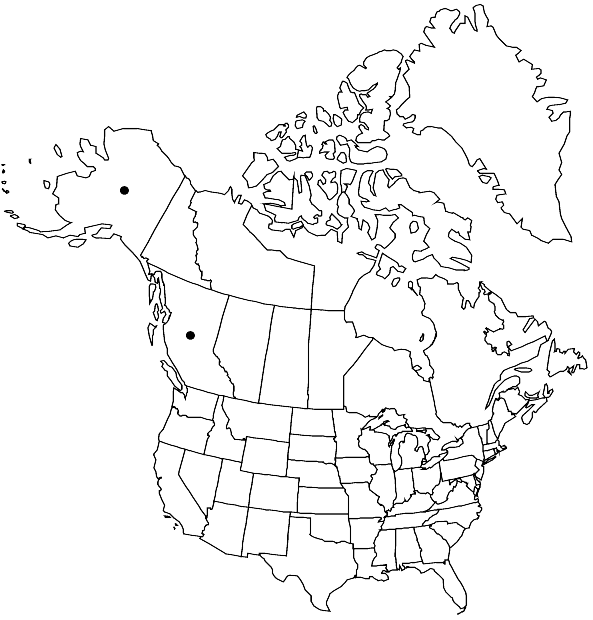Difference between revisions of "Polytrichastrum sexangulare var. vulcanicum"
Bryologist 95: 270. 1992,.
FNA>Volume Importer |
FNA>Volume Importer |
||
| Line 6: | Line 6: | ||
|place=95: 270. 1992, | |place=95: 270. 1992, | ||
}} | }} | ||
| − | |basionyms={{Treatment/ID/ | + | |basionyms={{Treatment/ID/Basionym |
|name=Polytrichum sexangulare var. vulcanicum | |name=Polytrichum sexangulare var. vulcanicum | ||
|authority=C. E. O. Jensen | |authority=C. E. O. Jensen | ||
| + | |publication_title=Bot. Tidsskr. | ||
| + | |publication_place=20: 109. 1896 | ||
}} | }} | ||
|synonyms={{Treatment/ID/Synonym | |synonyms={{Treatment/ID/Synonym | ||
| Line 30: | Line 32: | ||
|elevation=high elevations | |elevation=high elevations | ||
|distribution=B.C.;Alaska;e Asia (Japan);Atlantic Islands (Iceland). | |distribution=B.C.;Alaska;e Asia (Japan);Atlantic Islands (Iceland). | ||
| − | |discussion=<p>Variety vulcanicum is notable for the rather thick, curved seta, nodding, globose capsule, and the stem cortex composed of very thick-walled cells, in contrast to the thin-walled cortex of <i></i>var.<i> sexangulare</i>. It is probably best considered a variety of <i>P. sexangulare</i>, despite its distinctive peristome and the absence of capsule angles. E. Lawton (1971) described intermediate forms in British Columbia with acute-tipped leaves and angled capsules, but with the stem cortical cells and peristome of <i></i>var.<i> vulcanicum</i>.</p> | + | |discussion=<p>Variety vulcanicum is notable for the rather thick, curved seta, nodding, globose capsule, and the stem cortex composed of very thick-walled cells, in contrast to the thin-walled cortex of <i></i></i>var.<i><i> sexangulare</i>. It is probably best considered a variety of <i>P. sexangulare</i>, despite its distinctive peristome and the absence of capsule angles. E. Lawton (1971) described intermediate forms in British Columbia with acute-tipped leaves and angled capsules, but with the stem cortical cells and peristome of <i></i></i>var.<i><i> vulcanicum</i>.</p> |
|tables= | |tables= | ||
|references= | |references= | ||
| Line 53: | Line 55: | ||
|publication year= | |publication year= | ||
|special status= | |special status= | ||
| − | |source xml=https://jpend@bitbucket.org/aafc-mbb/fna-data-curation.git/src/ | + | |source xml=https://jpend@bitbucket.org/aafc-mbb/fna-data-curation.git/src/f6b125a955440c0872999024f038d74684f65921/coarse_grained_fna_xml/V27/V27_155.xml |
|genus=Polytrichastrum | |genus=Polytrichastrum | ||
|species=Polytrichastrum sexangulare | |species=Polytrichastrum sexangulare | ||
Revision as of 19:37, 24 September 2019
Plants small, forming large brownish mats. Stems with 5–6 layers of thick-walled cortical cells. Leaves incurved and closely appressed to the stem when dry, erect-spreading when moist; sheath poorly delimited; marginal lamina expanded and involute, covering the lamellae; perichaetial leaves abruptly narrowed to the blade. Seta arcuate with age. Capsule nearly globose, horizontal to nodding; peristome teeth 32, short, attenuate, the alternate teeth often smaller.
Habitat: Volcanic rocks
Elevation: high elevations
Distribution

B.C., Alaska, e Asia (Japan), Atlantic Islands (Iceland).
Discussion
Variety vulcanicum is notable for the rather thick, curved seta, nodding, globose capsule, and the stem cortex composed of very thick-walled cells, in contrast to the thin-walled cortex of var. sexangulare. It is probably best considered a variety of P. sexangulare, despite its distinctive peristome and the absence of capsule angles. E. Lawton (1971) described intermediate forms in British Columbia with acute-tipped leaves and angled capsules, but with the stem cortical cells and peristome of var. vulcanicum.
Selected References
None.